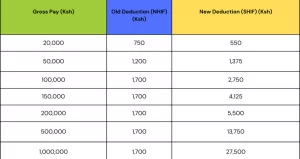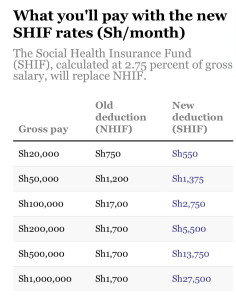In a significant move aimed at reshaping Kenya’s healthcare landscape, the Social Health Insurance Fund (SHIF) commenced operations on March 1, 2024.
Speaking at a prayer service attended by Deputy President H.E. Rigathi Gachagua at St Andrew’s Catholic Church in Kwanza Constituency, Trans Nzoia County, on February 11, 2024, Health CS Susan Nakhumicha emphasized the implementation of progressive policies to strengthen the nation’s health system.


“As a cornerstone of President William Ruto’s Bottom-Up Economic Transformation Agenda (BETA), the SHIF initiative aims to offer comprehensive health coverage to all Kenyans,” CS Nakhumicha stated. Under this initiative, vulnerable populations will gain access to a wide range of benefits, including screening, dialysis, kidney transplants, essential medications, and vital medical equipment. With regulatory approvals in place, the registration process is set to begin soon.
 This milestone marks a critical step towards achieving Universal Health Coverage (UHC) and shifting the healthcare focus towards preventive and promotive practices. All employed individuals under the insurance scheme are required to contribute 2.75% of their income to the fund, with the government covering contributions for those unable to afford them. Self-employed or unemployed Kenyans who previously paid KES 500 monthly to NHIF will now contribute KES 300, based on a graduated scale according to their financial capacity.
This milestone marks a critical step towards achieving Universal Health Coverage (UHC) and shifting the healthcare focus towards preventive and promotive practices. All employed individuals under the insurance scheme are required to contribute 2.75% of their income to the fund, with the government covering contributions for those unable to afford them. Self-employed or unemployed Kenyans who previously paid KES 500 monthly to NHIF will now contribute KES 300, based on a graduated scale according to their financial capacity.
SHIF Kenya addresses the fundamental healthcare needs of the country and provides a comprehensive range of services across various medical disciplines, aiming to ensure holistic healthcare coverage for all residents.
The shift from NHIF comes as a response to its longstanding role in providing quality and affordable healthcare insurance for over 57 years, primarily benefiting employed Kenyans. However, the informal sector and unemployed individuals often had to manage their healthcare needs independently.
NHIF membership is mandatory for salaried employees, with contributions deducted automatically each month based on income class. In contrast, membership for the self-employed or those in the informal sector has been voluntary, requiring specific monthly contributions for eligibility. Despite numerous reforms over the years, NHIF faced challenges in bridging the healthcare service gap, with only about 4.5 million Kenyans (11% of the population) registered as members in 2014. SHIF aims to address and improve upon these shortcomings moving forward.
Story by Saenyi Barasa
